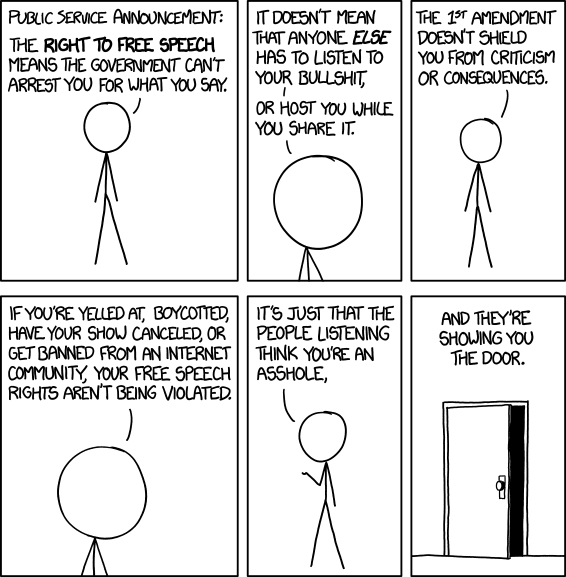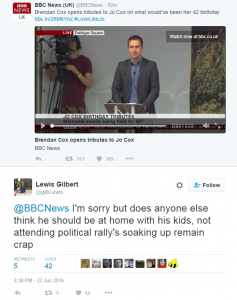As a blogger I would be some sort of super hypocrite if I wasn’t a proponent of free speech and open constructive discourse. A blogger is bound to have an opinion on everything. And as such I am a proponent of free speech and open constructive discourse. Hurrah! But I think we’re currently suffering a malaise of what I like to refer to as Vox Horribilis for several reasons.
A blog and by extension social media are the idea place to make your voice heard… within reason. I can use many words to describe my thoughts on this but I think Randall Munroe sums it up nicely with this comic:
This misconception that free speech protects you to behave like an arsehole is odd but it is also dangerous as it empowers exactly the sort of people who do not need empowering to behave like arseholes. This misconception leads to this sort of behaviour:
Got this today for speaking out for Remain….. This has to stop. pic.twitter.com/HPV8asrZ3w
— Yvette Cooper (@YvetteCooperMP) June 21, 2016
Or indeed trolling a widower at a memorial service for his wife:
This is part of the bigger issue of online harassment and the online harassment of women in particular but it is encouraged by the misconception that individuals have a right to do and say what they believe in.
The other big misconception relates to the logical fallacy that all opinions are equally weighted and is unfortunately fostered by places like the BBC and it’s obsession with a very narrow concept of something it refers to as “balance”.
Recently we’ve seen this in spades with the referendum. Brexiters are still shouting (they do a lot of shouting) about the £350m a day we spend on Europe and woe betide any expert that tries to correct them.
This contradiction is not just on an institutional level though, it’s down to individuals. I happened to read through John O’Brennan‘s timeline recently. John is a legal expert with 20 years of experience in EU accession regulations. John has regularly been contradicted by people like Damien, who runs an Aston Villa blog, and who thinks Johns assertions on a veto over new members joining are wrong:
“uk doesn’t have a veto. If you believe that you’re a nutter.”
Damien thinks that his opinion should be equally weighted with that of John. Damien thinks that he knows better but Damien has unwittingly made a very clever statement. Or at least used language that enables me do the clever statement, what he has said is complete tosh of course.
Damien’s use of the word “believe” unveils the heart of the problem we have seen manifested during the referendum debate and generally with confrontational differences of opinion on the internet. The biggest malaise we suffer from in the 21st century is relativism. Relativism is the concept that points of view have no absolute truth or validity within themselves, but rather only relative, subjective value according to differences in perception and consideration.
If Damien can’t understand basic points about a veto, I doubt he could grasp the concept of absolute truth but it’s at the heart of our problems currently. In our society the relativism comes from a base of ignorance and self importance/entitlement that was fostered by Thatchers ideology and the “me” generation that arose from it.
The BBC pushes relativism on us almost by accident in it’s struggle for “balance”. You can see it in the referendum reporting- the Stay campaign says we have a veto, the BBC have to respond with a statement from the Leave campaign that says we don’t. The truth of it is surrendered in the struggle for balance, which implicitly reinforces the idea that there is no absolute truth when in fact there is.
It is a potent and poisonous cocktail, a combination of people assuming that they can make any statement they want to without repercussions (the Tory councillor who put on Facebook that he would donate the steam from his piss to the Jo Cox collection has found out how wrong this assumption actually is), and the perception that every opinion is equally valued and there are no absolute truths except the ones you happen to believe in.
This cocktail has lead to a situation where extreme views are expressed with impunity- witness the number of “false flag” tweets surrounding the Cox murder as Brexiters sought to reassure each other that Remain actually arranged for her murder to derail the exit campaign- or even Michael Gove’s comments that we’re tired of experts.
I’m not tired of experts. I’d rather have seen 20 academics having a round table discussion at prime time last night that a bunch of ill-informed members of the public asking meaningless questions for hours on the telly. It plays in to the hands of people like Boris who are the soundbite generation, and think rhetoric is superior to knowledge. In a way of course Boris is right, if he can force the narrative on to rhetoric and away from knowledge, it is more important.
As a university graduate (the first one in my extended family), I was taught to critically evaluate different opinions and reach my own conclusion. It’s not difficult, as long as you are willing to have an open mind and assume that in the majority of situations no solution will be entirely black and white. If I see something that I believe in, I will seek out the opposing view to see if my initial belief stands up to scrutiny. Yes, it’s quicker to make a snap judgement and to only seek out self validating arguments from people that agree with your opinion but then you’re arguably doing a disservice to the cause you’re championing aren’t you?
This is a skill I hope to teach my children when they’re older, and if they take it on board, it will put them in a good place for life generally.

